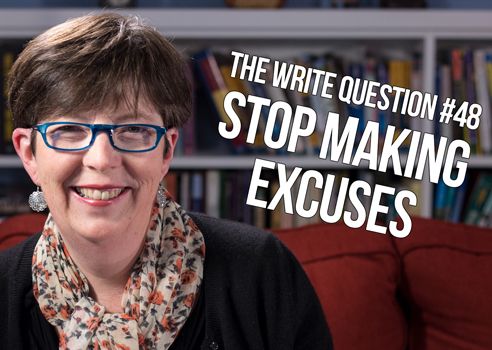Viewing time: 3 min. 48 sec.
The Write Question is a weekly video podcast about writing that I started in 2017 and that ran, more or less weekly, until April 2022. This is a republication of issue #48, about writerly guilty and how it can derail you. The post first ran on March 2/18.
Transcript:
Welcome to The Write Question, I’m Daphne Gray-Grant. Today we’re talking about dealing with writerly guilt.
I’m answering a question from Marie Landry in Montréal, Quebec. Here’s what she asked via email.
I’m failing to stay on track with my writing and I feel as though I’m constantly having to make excuses to myself. It makes me feel bad about writing and it makes me feel bad about me. Do you have any suggestions for how I can deal with this problem?
Thanks for the question, Marie. I want to reassure you that you are not alone in thinking you might be failing. Let me tell you a couple of suggestions that I hope will make you feel better.
First, it’s time to get rid of writerly guilt. Writing is hard work and you don’t need the extra burden of guilt to slow you down. Feeling guilty is like carrying around a 10-pound bag of flour when you don’t need to. Put the sack down and you might have more energy for writing. Interestingly, research has shown that guilt is an ineffective way to control behaviour.
In a 2013 study published in the journal Appetite, psychologists found that people who linked chocolate cake with guilt rather than with celebration had more trouble losing and maintaining weight. Instead of acting as a positive motivating force, guilt actually leads to feelings of helplessness and lack of control.
Second, look at what you’re demanding of yourself and consider that you might have standards that are too high. If you have a fulltime job and you’re also writing ON TOP of that commitment, then keep the writing work small and contained. You shouldn’t be writing more than 30 minutes a day and 15 minutes might be enough.Be aware that in addition to work, responsibilities like raising young children or looking after ageing parents, might also be a challenge. The main thing is to ensure your writing habit is sustainable. We can all do something extraordinary for a short time but if you’re writing a book, you need to be able to manage the task for the long haul. If you’re constantly having to make excuses, then reduce the commitment so you don’t need to make excuses anymore.
Third, don’t always focus on where you’ve failed or what you’ve done wrong. Instead, look for chances to celebrate what you’ve accomplished. Did you write an extraordinarily good paragraph the other day? Celebrate that! Did you do some really good research? Pat yourself on the back!And I don’t mean metaphorically. Give yourself some real rewards. They don’t have to be expensive, or unhealthy! I’d recommend going for a walk, a nice coffee, or an interesting magazine. Find something that gives you pleasure, however small, and tie that to your accomplishment. The ultimate reward for writing a book — being able to hold it in your hands — is a long way off. So, make sure you give yourself plenty of rewards so you can continue to feel cheerful and acknowledged. Happy writers are better and more productive writers. Do whatever it takes to make yourself happy.
Finally, while we’re on the subject of writerly guilt, let me wrap up with a fire and brimstone comment from the 17th century English churchman Robert South: “Guilt upon the conscience, like rust upon iron, both defiles and consumes it, gnawing and creeping into it, as that does which at last eats out the very heart and substance of the metal.”
Thanks for your question, Marie. I hope you can put your guilt on hold.
Links:


